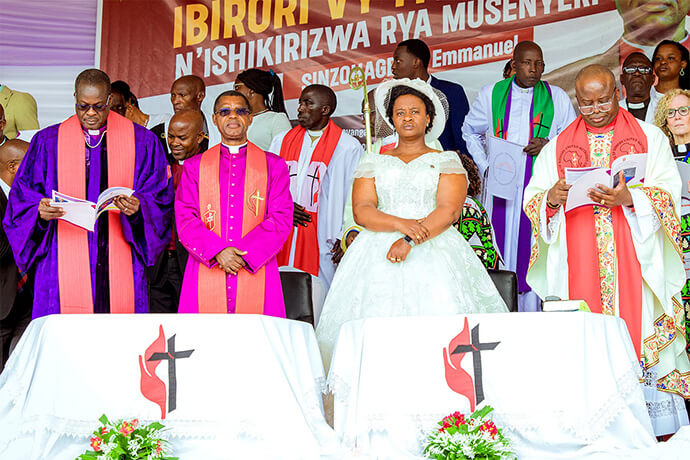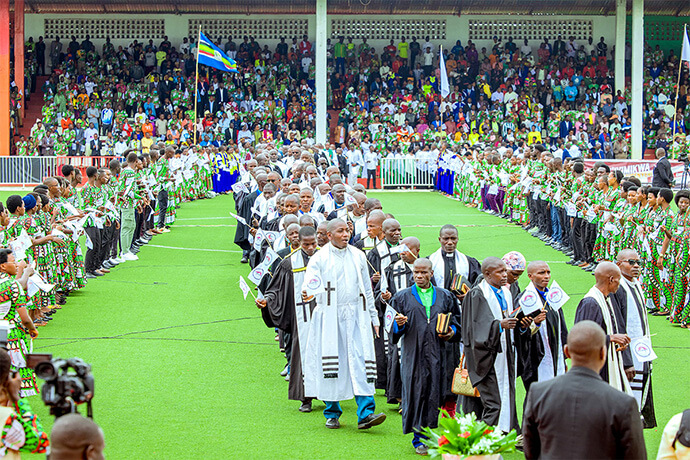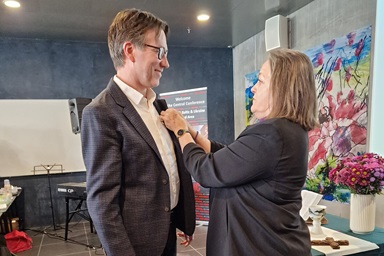Key points:
- United Methodists from Burundi and Rwanda united for the installation of the area’s first bishop and establishment of the East Africa Central Conference.
- Burundi’s president was among the thousands in attendance at the celebration, along with other government officials, church members and civic leaders.
- Newly elected Bishop Emmanuel Sinzohagera said the new episcopal area will focus on evangelism and church revitalization, including church planting, discipleship and theological education.
Over 4,000 people gathered at Ingoma Stadium in Burundi’s political capital March 29 to celebrate the establishment of The United Methodist Church’s new Burundi-Rwanda Episcopal Area and installation of its first bishop, Emmanuel Sinzohagera.
Burundi President Evariste Ndayishimiye, First Lady Angeline Ndayishimiye, government officials, church members and civic leaders attended the colorful event, which was punctuated by local traditional music and dance and featured several church choirs.
Ndayishimiye congratulated the delegates for electing Sinzohagera and urged the church to remain united.
“No development is possible if people are divided. I know The United Methodist Church members will be role models. Those who are hungry cannot hear your sermons, so you have to focus on projects and development,” he said.

Sinzohagera, the first bishop elected March 15 at the Africa Central Conference, told UM News the vision of the new episcopal area is “to make the church vibrant, holistically awake, evangelistically functional and economically self-reliant.”
Income projects underway to attain self-reliance include sunflowers, edible mushrooms and a piggery under the Yambasu Agriculture Initiative, which utilizes United Methodist land holdings on the continent for crops and animal raising and also works with area farmers to aid agriculture production. A project is planned for each of the 11 districts in Burundi, Sinzohagera said.
Scenes from the celebration
The United Methodist Church also has properties that need to be developed to realize income from rentals, he added.
“A strategic plan has been developed, and one of the priorities is enhanced evangelism and church revitalization. To implement that priority, we will focus on church planting, discipleship, development of opportunities for missionary engagements, enhanced ecumenical relationships and developing theological education,” he said.
Sinzohagera is currently the Burundi speaker of the Senate; his term will end Aug. 20.
“This position has enabled me to strengthen relations with the government,” he said, noting agreements between the church and the Ministry of Education and the Ministry of Health that have provided government assistance to church ministries.
“I believe that these relations will continue even after the end of my term,” he said.

North Katanga Area Bishop Mande Muyombo, president of the Africa Colleges of Bishops, said the new episcopal area acknowledges the birthplace of Methodism in East Africa and its success regardless of past challenges in the region. After more than a decade of internal divisions, Burundi fully reunited with The United Methodist Church in 2018.
“Out of the pains of the divisions came reconciliation facilitated by the general church leadership and perseverance from lay and clergy and the strong leadership of Bishop Daniel Wandabula. This is a renaissance of United Methodism in East Africa and the continent at large and regardless of any challenge, we will always rise up and move forward,” he said.
Sinzohagera was the first of three Africa University graduates elected by the Africa Central Conference in Johannesburg last month.
“We feel very ecstatic,” said Wenham Peter Dabale, director of alumni and church relations at the United Methodist institution. “We knew from day one that he was prepared, having passed through our systems at Africa University and, being a humble man, we know that he will deliver on the episcopal assignment he was given.”
Africa University graduates occupy leadership positions in church, government and private organizations across the continent. Dabale said you can see the impact of the university through its graduates and their work in the community.
“Remember the first mission why AU was formed was to transform Africa, so we are truly investing in Africa’s future, and we thank God that all these blessings are coming in our lifetime.”
The Rev. Valentine Cimpaye, the sole female district superintendent in Burundi, said she was excited about the new episcopal area and the opportunity for more female leadership. She oversees the Bujumbura District in the nation’s capital.
“I believe our new bishop can appoint another woman superintendent. That is my wish,” she said.
Burundi women’s coordinator, Godelieve Manirakiza, said she was happy that the celebration took place during Women’s History Month.
“We have a place in the church; the church recognizes us, especially this new bishop,” she said. “He is for women. He values the importance of women and their work, activities and programs. So we are very happy and are ready to work with him as we have his support.”
Manirakiza said the women’s group in Burundi will be working with women in Rwanda.
“We shall be networking with them and also need to coordinate with women in East Africa as part of the new central conference,” she said.
Subscribe to our
e-newsletter
Leoncie Uwambaza, the women’s coordinator of the Rwanda Provisional Annual Conference, is looking forward to connecting with members of the new episcopal area.
“Burundi is our neighboring country. We have a common language. Kinyarwanda and Kirundi are almost the same, and we have a common culture. We will be learning from Burundi how we can grow and develop the women’s ministry.”
Pablo Nyasinde Mwamba Rashidi, a young adult from the Tanzania Conference, traveled to Burundi to witness the installation ceremony.
“It was a remarkable event,” he said. “When you have a child and they learn and graduate from school, you must congratulate him or her for the good result and succeeding in the examination. Burundi is now like a child who graduated from school. We are an annual conference, so we learn from them. Maybe in the future, we will have our own episcopal area.”
The newly established East Africa Central Conference consists of the United Methodist presence in Burundi, Rwanda, Ethiopia, Kenya, South Sudan and Uganda.
The central conference held its first session and elected leadership in Gitega on March 30.
“This is the time to lay the foundation for growth in East Africa,” said Bishop Wandabula, who chaired the meeting.
“Today marks a milestone in the life of our church, a new chapter filled with great promise. We are not merely building an institution; we are answering a higher call to advance God’s Kingdom across the East African region through unity, vision and mission,” he said.
“This is not about us, it is about the greater purpose of God’s love and grace reaching the world through the church.”
Chikwanah is a UM News correspondent based in Harare, Zimbabwe.
News media contact: Julie Dwyer at (615) 742-5470 or [email protected]. To read more United Methodist news, subscribe to the free UM News Digests.




